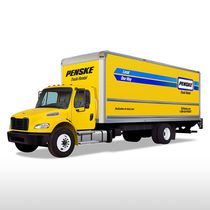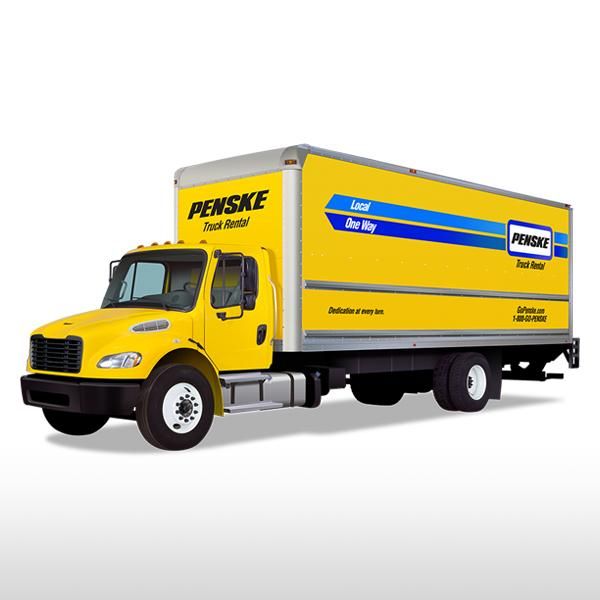A 26 ft box truck can typically hold a weight of 12,000 to 15,000 pounds. This weight capacity can vary depending on the specific model and manufacturer of the truck.
When it comes to transporting goods, the weight capacity of a truck is a crucial factor to consider. A 26 ft box truck, commonly used for commercial and residential moving, has a weight capacity ranging from 12,000 to 15,000 pounds.
Understanding the maximum weight the truck can hold is essential for businesses and individuals to ensure safe and efficient transportation of goods. We’ll explore the factors that determine the weight capacity of a 26 ft box truck, and provide insights on how to maximize its hauling potential. Whether you’re planning a move or managing a logistics operation, knowing the weight limit of a 26 ft box truck is essential for successful transportation.

Credit: www.pensketruckrental.com
Navigate As You Want:
1. Weight Capacity Of A 26 Ft Box Truck
A 26 ft box truck has a weight capacity determined by its Gross Vehicle Weight Rating (GVWR), payload capacity, and various factors affecting weight capacity. GVWR is the maximum weight a vehicle is designed to carry, including the weight of the truck itself, cargo, and passengers. The payload capacity refers to the weight of the cargo that can be safely loaded into the truck. It is the difference between the GVWR and the empty weight of the truck.
Several factors affect the weight capacity of a 26 ft box truck. The truck’s structural design and chassis strength play a crucial role. The distribution of weight within the truck also affects its capacity. The position of the cargo and how it is secured can impact the handling and stability of the vehicle. Additionally, road conditions and the truck’s suspension system must be considered to ensure safe operation of the truck within its weight limits.

Credit: www.pensketruckrental.com
2. Determining The Weight Limit
Driving a 26 ft box truck requires understanding the weight limits for safety. Axle weight limits determine the maximum load the truck can handle without causing damage. Calculating the maximum load involves considering the weight of the cargo and distribution. Staying within the weight limit is essential to ensure safe handling and compliance with regulations.
3. Legal Restrictions And Compliance
The weight capacity of a 26 ft box truck is subject to legal restrictions and compliance. Federal weight regulations set maximum load limits for commercial vehicles, and these regulations vary by state. State-specific regulations may impose additional restrictions or requirements. Penalties for overloading can result in hefty fines, license suspension, or even vehicle impoundment. It’s crucial for truck operators and businesses to adhere to all weight regulations to avoid legal repercussions and ensure safety on the road.
4. Safety Considerations
A 26 ft box truck is a versatile vehicle that can handle a significant amount of weight. However, it is important to consider several safety considerations to ensure both the vehicle’s performance and cargo security. Impact on Vehicle Performance: The weight of the cargo can have a direct impact on a box truck’s performance, including acceleration and fuel efficiency. It is crucial to adhere to the recommended weight limits specified by the manufacturer to maintain optimal performance. Braking and Handling: The weight distribution within the truck affects its braking and handling capabilities. Improperly loaded cargo can result in instability and compromised stopping distances, leading to potential accidents. Securing Cargo: Properly securing the cargo is vital to prevent shifting while the truck is in motion. Cargo restraints such as straps, hooks, and tie-downs should be used to ensure that the cargo remains in place and does not pose a risk to the driver or others on the road.
5. Other Factors To Consider
When determining the weight a 26 ft box truck can hold, it’s important to consider other factors such as the truck’s maximum payload capacity, weight distribution, road conditions, and proper loading techniques. These factors play a crucial role in ensuring the truck operates safely and efficiently while transporting heavy loads.
In determining the weight capacity of a 26 ft box truck, it’s important to consider other factors that can affect its load. Firstly, weight distribution plays a crucial role in ensuring the truck’s stability and safety on the road. It is recommended to evenly distribute the weight throughout the truck’s cargo area, keeping the center of gravity low. This reduces the risk of accidents and allows for better handling. Secondly, environmental factors such as road conditions, weather, and elevation can impact the truck’s performance. It’s essential to take these into account while estimating the weight that the truck can safely carry. Lastly, insurance coverage is another factor to consider. It’s necessary to review your insurance policy to ensure that it adequately covers the weight capacity of the truck and any potential liability in case of an accident or damage. Bear in mind these various factors to determine the appropriate weight to load into a 26 ft box truck.
Credit: www.pensketruckrental.com
Frequently Asked Questions On How Much Weight Can A 26 Ft Box Truck Hold
How Much Weight Can A 26 Ft Box Truck Hold?
A 26 ft box truck can typically hold a maximum weight of 10,000 to 12,000 pounds. However, the exact weight capacity may vary depending on the make and model of the truck, as well as any weight restrictions imposed by road regulations or the truck’s design.
What Is The Average Payload Capacity Of A 26 Ft Box Truck?
The average payload capacity of a 26 ft box truck ranges from 5,000 to 7,000 pounds. This refers to the weight of the cargo that the truck can carry in addition to its own weight. It’s important to keep in mind that the payload capacity may be slightly lower once the weight of fuel and other equipment is taken into account.
How Does Weight Distribution Affect A 26 Ft Box Truck’s Capacity?
Proper weight distribution is crucial for maximizing a 26 ft box truck’s capacity. Placing most of the weight towards the front of the vehicle can improve stability, while evenly distributing the weight across the truck’s axles can help prevent excess strain on the tires and suspension system.
Consult the truck’s manual or a professional for specific weight distribution guidelines.
Can A 26 Ft Box Truck Carry Cars Or Other Heavy Vehicles?
Yes, a 26 ft box truck can carry small to medium-sized cars, provided their weight and dimensions fall within the truck’s capacity limits. However, it’s important to ensure proper securing and protection of the vehicles during transportation. Consulting with professional car transport services or experienced drivers is recommended for safe and efficient handling of heavy vehicles.
Conclusion
To sum up, the weight capacity of a 26 ft box truck varies depending on factors such as the truck’s manufacturer and design. However, on average, such a truck can hold a maximum weight of approximately 12,000 to 15,000 pounds.
It is important to remember that exceeding this weight limit can lead to safety hazards and potential damage to the truck. Therefore, it is crucial to carefully calculate and distribute the weight when loading a 26 ft box truck.



